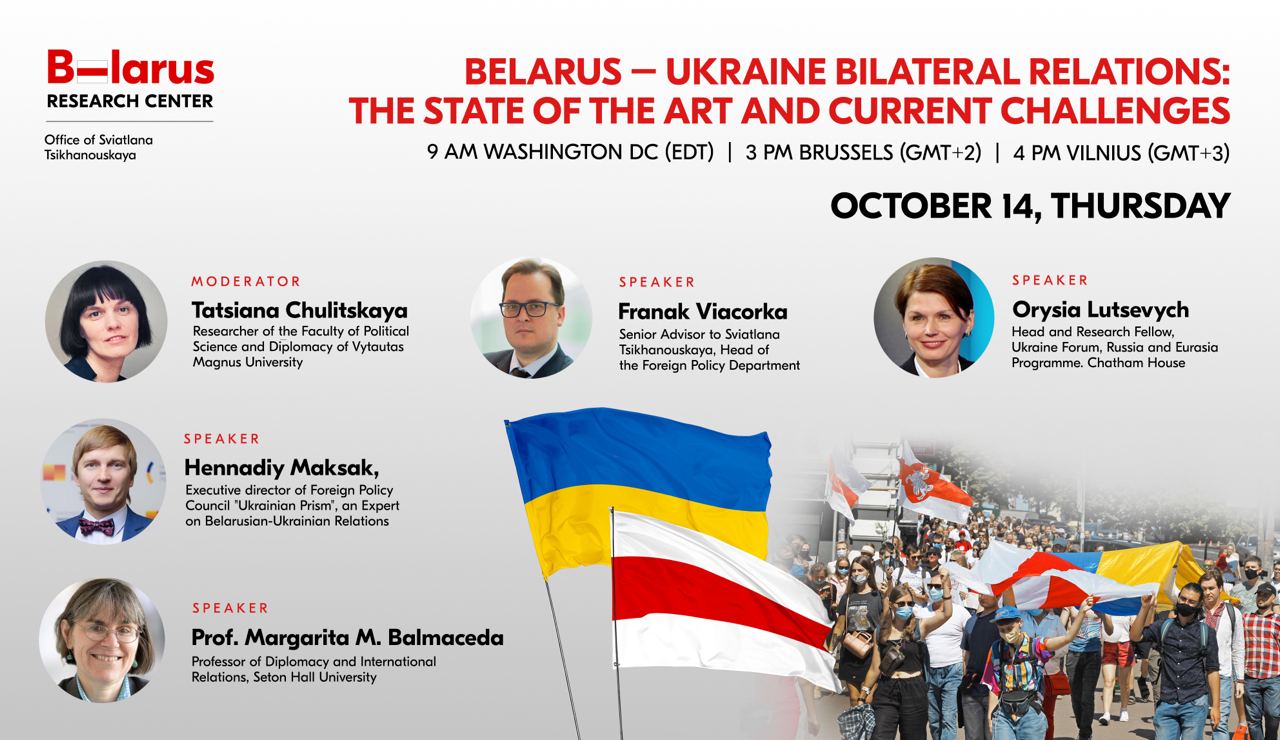The Research Center of Sviatlana Tsikhanouskaya's Office holds weekly online discussions with international experts on Belarus’ pressing matters. On October 14, 2021, we discussed the topic “Belarus-Ukraine bilateral relations: the state of the art and current challenges”.
Franak Viacorka, Senior Advisor to Sviatlana Tsikhanouskaya and Head of the Foreign Policy Department, Hennadiy Maksak, executive director of Foreign Policy Council, Ukrainian Prism, and expert on Belarusian-Ukrainian relations, an expert on Ukraine, research fellow, Orysia Lutsevych, manager of the Ukraine Forum in the Russia and Eurasia Programme at Chatham House, and Margarita M. Balmaceda, Professor of Diplomacy and International Relations at Seton Hall University shared their visions of Belarus-Ukraine bilateral relations and outlined prospects for cooperation of Belarusian democratic forces with the Ukrainian establishment or civil society. Tatsiana Chulitskaya, political scientist and senior researcher at Vytautas Magnus University, moderated the discussion.
Belarus-Ukraine relations have always had their ups and downs, but nobody could neglect their importance. Currently, relations between the two countries are experiencing, in some opinions, the deepest crisis ever. Belarusian authorities are stepping up in the military cooperation with Russia and intensifying anti-Western foreign and domestic policies, declaring, for instance, the possibility to recognize Crimea as a part of Russian territory and cooperate with law enforcement agencies of the self-proclaimed authorities of Donbas. At the same time, authorities of Ukraine have declared support to the democratic forces of Belarus and for the democratic aspirations of the Belarusian people. They do not recognize the legitimacy of Aliaksandr Lukashenka; they support the course of the European Union and the United States on the isolation of the Belarusian regime, however preserving economic relations and abstaining from imposing sectoral sanctions on the official Minsk.
What problems exist in the relations between Belarus and Ukraine today? Would the existing tensions between official Minska and Kyiv intensify, and what consequences may they have for the two countries? What positions should Ukraine take in the Belarusian political crisis? How should Ukraine develop its relations with the official Minsk, democratic leaders and cooperate with the EU and the USA on the Belarusian agenda?
The experts came to the following conclusions:
- After the Belarus protests sparked, there were statements by Ukrainian politicians in support of changes in Belarus. Ukraine and Ukrainian civil society were comparing events in Belarus to the Ukrainian Maidan.
- There is ambivalence in Ukraine's position towards Belarus. The Ukrainian government simultaneously declares support for Belarus’ civil society, but it is still interested in pragmatic trade cooperation with Belarus. Ukraine also preserves diplomatic communication channels with the official Minsk to ensure opportunities for discussion on security issues.
- Meanwhile, Belarus poses an increasing security threat to Ukraine regarding the new Russian military objects in the country.
- Ukraine has to choose whether to be hostage to Lukashenka's threats to recognize Crimea or the self-proclaimed territories of Donbas, stop the transit, or oppose the regime that poses threats to its security.
- Ukraine joined three packages of sanctions of the European Union. It imposed individual sanctions on the Belarusian officials but did not support sectoral sanctions. The reasons are dependency on the import of refined oil and other products from Belarus and the worries about increased Belarus-Russia military cooperation and integration.
- In the short term, Ukraine can't substitute strategic imports from Belarus. However, in the mid-term, it is possible and advisable to diversify those imports considering Belarus' potential involvement in blackmail and increased anti-Ukrainian pressure on Lukashenka from Russia. The European Union may support Ukraine in its stand against the Belarusian regime.
- Belarus-Ukraine bilateral relations have always been backed by the relations of both countries with Russia. The soar in their relations that started after 2014-2015 has ended; the Minsk process cannot be continued. Now, Ukraine could promote greater involvement of the EU in Belarus-Ukraine relations.
- Belarusian democratic forces are in contact with Ukraine on the MFA level and within the international organizations. With its aspirations to become a regional leader, Ukraine has attempted to promote the Belarusian issue in organizations like the Lublin Triangle, but the attempts didn’t result in real outcomes.
- In order to build trust with Ukraine, Belarusian democratic forces may promote their vision of future relations and increase contacts with Ukraine in international organizations.
- Belarusian democratic forces should cooperate with representatives of different political sectors and parties in Ukraine. Though, this cooperation must be diverse and must not be hijacked by just one actor, especially an extreme one.
- According to different estimates, from 120 to 200 thousand Belarusians have fled to Ukraine because of political reasons. There are also concrete examples of how Ukraine helped Belarusians forced to leave the country.
- However, there is not enough infrastructure for assisting Belarusian refugees in Ukraine. With the increased flow of migrants from Belarus, civil society organizations (CSOs) and volunteers can't handle helping everyone. The Ukrainian government has limited capabilities in assisting Belarusian refugees because of the influx of internally displaced persons. However, it could ease the immigration procedures or facilitate Belarusian CSOs’ work in Ukraine.
- Civil society cooperation is necessary both for building trust between Ukraine and Belarus and improving public outreach – and assisting Belarusians who were forced to leave the country in Ukraine.
- Public outreach is vital for the Belarus-Ukraine people-to-people relations. Belarusians should understand what has been happening in Ukraine since Maidan, and Ukrainians should see the essence of the Belarusian events.
For questions about the discussion, contact researchcenter@tsikhanouskaya.org.
For the OST position on Belarus-Ukraine relations, contact Senior Advisor to Sviatlana Tsikhanouskaya, Head of the Foreign Policy Department Franak Viacorka: franak@tsikhanouskaya.org.








